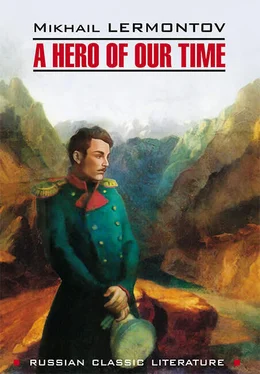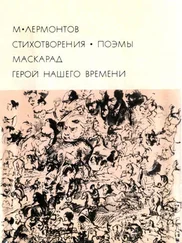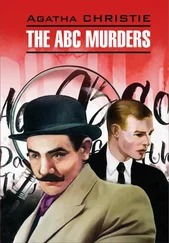Chains were passed through the wheels for brakes to prevent them from getting out of control. Leading the horses by their bridles we began the trip down. To the right of us was a cliff, and to the left an abyss so deep that an Ossetian village at the bottom looked like a swallow’s nest. I shuddered at the thought that a dozen times a year some courier rides through the dark night along this road too narrow for two carts to pass, without getting off his jolting carriage. One of our drivers was a Russian peasant from Yaroslavl, the other an Ossetian. The Ossetian took the leading horse by the bridle after unhitching the first pair in good time and taking every other possible precaution, but our happy-go-lucky Russian didn’t even bother to get down from the box. When I suggested that he might have shown some concern, if only for my suitcase, which I had no desire to go down into the abyss to recover, he replied: “Don’t worry, sir! With God’s help we’ll get there just as well as they. This is not the first time we’ve done it.” And he was right – true, we might not have got through safely, yet we did. And if all men gave the matter more thought they would realize that life is not worth worrying over too much…
Perhaps you wish to hear the story of Bela to the end? Firstly, however, I am not writing a novel but simply travel notes, and hence I cannot make the captain resume his story sooner than he actually did. So you will have to wait, or, if you wish to do so, skip a few pages; only I do not advise you to, for the crossing of Mount Krestovaya, Mountain of the Cross (or le Mont St Christophe as the learned Gamba calls it) is worthy of your interest. And so we descended from Mount Gud to Chertova Valley. There’s a romantic name for you! Perhaps you already visualize the den of the Evil Spirit among the inaccessible crags – but if you do, you are mistaken: Chertova Valley derives its name from the word cherta 5 5 line or boundary
and not chort 6 6 devil
, for the boundary of Georgia once passed here. The valley was buried under snow drifts which gave the scene a rather strong resemblance to Saratov, Tambov and other spots dear to us in our mother country.
“There’s Krestovaya,” said the captain as we came down to Chertova Valley, pointing to a hill shrouded by snow. On the summit the black outline of a stone cross was visible, and past it ran a barely visible road which was used only when the road along the mountainside was snow bound. Our drivers said that there were no snow slides yet and in order to make it easier for the horses they took us the long way. Around a bend in the road we came upon five Ossetians who offered us their services, and, grabbing hold of the wheels and shouting, they began to help our carriage along. The road was dangerous indeed. To our right masses of snow hung overhead ready, it seemed, to crash down into the gorge with the first blast of wind. Some sections of the narrow road were covered with snow, which here and there gave way underfoot; others had been turned to ice under the action of the sun’s rays and night frosts, so that we made headway with difficulty. The horses kept slipping, and to the left of us yawned a deep fissure with a turbulent stream at the bottom that now slipped our of sight under a crust of ice, now plunged in frothy fury amidst black boulders. It took us all of two hours to go around Mount Cross – two hours to negotiate barely one mile! In the meantime the clouds came lower and it began to hail and snow. The wind bursting into the gorges howled and whistled like the Nightingale Robber, and soon the stone cross was blotted out by the mist which was coming in waves from the east, each wave thicker than the last. Incidentally, there is a queer but generally accepted legend that this cross was raised by Emperor Peter I when he traveled through the Caucasus. Yet, in the first place, Peter was only in Daghestan, and, secondly, an inscription in big letters on the cross said it had been put up on the orders of General Yermolov, in 1824, to be exact. Despite the inscription, the legend had taken such firm root that one is at a loss to know what to believe, all the more so since we are not used to putting our faith in inscriptions.
We had another three miles to go down along the ice-coated rocky ledges and through soft snow before reaching the station at Kobi. The horses were exhausted and we were thoroughly chilled, while the blizzard blew harder and harder much like our native, northern snow storms, except its wild refrain was sadder and more mournful. “You too are an exile,” thought I, “mourning your wide, boundless steppes where there was space to spread out your icy wings, whilst here you are choked and hemmed in like the eagle who beats against the bars of his iron cage.”
Looks bad,” the captain was saying. “Nothing visible but mist and snow. If we don’t take care we’ll find ourselves falling into a gorge or getting stuck in some hole, and the Baidara down there will probably be running too high to cross. That’s Asia for you! The rivers are as unreliable as the people.”
The drivers shouted and swore as they whipped the snorting, balking horses which refused to take another step in spite of the eloquence of the whips. “Your Honor,” one of the drivers finally said, “we can’t reach Kobi today. Had we not better turn to the left while there is still time? Over on that slope there are some huts, I believe. Travelers always stay over there in bad weather.” Then he added, pointing to an Ossetian: “They say they’ll guide us there if you give them some money for vodka.”
“I know it, buddy, I know without you telling me!” said the captain. “These crooks! They always think up something to pick up a tip.”
“All the same you have to admit that we’d be worse off without them,” said I.
“Maybe, maybe,” he muttered, “but I know these guides! They can tell by instinct when to take advantage of you – as if you couldn’t find your way without them.”
So we turned to the left and somehow after a good deal of trouble made our way to the scanty refuge consisting of two huts built of slabs and stones and surrounded by a wall of the same material. The tattered inhabitants gave us a cordial welcome. Later I found out that the government pays and feeds them on condition that they take in wayfarers who are caught by the storm.
“It’s all for the best,” said I, taking a seat by the fire. “Now you’ll be able to tell me the rest of the story about Bela; I’m sure that wasn’t the end of it.”
“What makes you so sure?” replied the captain, with a sly smile and a twinkle in his eye.
“Because things don’t happen like that. Anything that begins so strangely must end in the same way.”
“Well, you guessed right…”
“Glad to hear it.”
“It’s all very well for you to be glad, but for me it is really sad to recall. She was a fine girl, Bela was! I grew as fond of her in the end as if she were my own daughter, and she was fond of me too. I ought to tell you that I have no family. I haven’t heard about my father or mother for some twelve years now, and I didn’t think about getting a wife earlier – and now, you’ve got to admit, it would no longer be quite right. So I was happy to have found someone to spoil. She would sing to us or dance the Lezghinka… And how she danced! I’ve seen our provincial fine ladies and once some twenty years ago I was at the Nobles’ Club in Moscow, but none of them could hold a candle to her. Pechorin dressed her up like a doll, petted and fondled her, and she grew so lovely that it was amazing. The tan disappeared from her face and arms, and her cheeks grew rosy… How gay she was! How she used to tease me, the little vixen… May God forgive her!”
Читать дальше

![Михаил Лермонтов - A Hero of Our Time [New Translation]](/books/27671/mihail-lermontov-a-hero-of-our-time-new-translati-thumb.webp)










